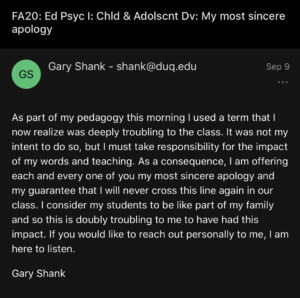

Kellen Stepler | Editor-in-Chief
09/11/2020
Gary Shank, the Duquesne professor placed on administrative leave Friday due to racially insensitive comments in class, is demanding to be reinstated by the university in a letter submitted to university president Ken Gormley Wednesday, Sept. 16.
Warner Mariani, Shank’s attorney, said that Duquesne set a 5 p.m. deadline yesterday, Thursday, Sept. 17, for Shank to submit his resignation. Mariani said that Shank has no intention to resign.
“We believe he should be reinstated, and teach the way he’s been teaching for decades at the university,” Mariani said.
The Foundation for Individual Rights in Education (FIRE), an organization that focuses on protecting free speech rights on American college campuses, wrote an email to Gormley to “immediately reinstate Shank and publicly reaffirm that its faculty retain the broad rights of free expression and academic freedom that Duquesne promises.”
While it’s not a First Amendment case, it “touches on freedom of expression and academic expression,” Mariani said. A 1988 political science graduate from Duquesne, Mariani said “it’s not his university to do that,” and that in an academic setting, the word can be used to discuss current issues in America.
“He did not use it to harass people,” Mariani said. “It’s like we’re supposed to erase that word.”
Gabriel Welsch, vice president of marketing and communications at Duquesne, said, “the university only today received the letter and is still reviewing it.”
“We are aware that the individual has now retained counsel, and so this is a legal and personnel matter, on which we really cannot comment further,” Welsch said.
The letter was sent in response to Shank’s suspension following the circulation of a video Friday of him using a racial slur in a Zoom lecture which led to him being placed on administrative leave.
In the video, Shank said the N-word repeatedly and gave students permission to use it. In the following lecture, Shank apologized repeatedly to the class.

He also sent an email in which he wrote that he was troubled by the impact his words had on the students, saying he considered them to be like family.
Shank declined to comment for this article.
Welsch said in an email to The Duke that Shank is not teaching, and another professor will be taking over the course, Educational Psychology.
Welsch also said that further specifics cannot be discussed, as this is a “personnel matter.”
In the video that circulated widely through social media, Shank explained how the word could be used in the “pedagogical sense.” He then gives examples of when the word was used when he was younger.
“It was one of the most uncomfortable classes I’ve ever participated in,” sophomore secondary education history major Katie Rhodes said. “Racial insensitivity is never ok and for a professor to hide behind a racial slur by saying it was for educational purposes is extremely disappointing and made me appalled.”
Rhodes said that the incident made her trust Shank less.
“The fact that he thought that it was ok to say that in class makes me afraid that things like that still happen,” Rhodes said. “As a future educator, I’m extremely upset. No student should have to feel scared to go to class and fear that they will hear a racial slur.”
The Duke obtained the Sept. 9 email Shank sent to his Educational Psychology class with the subject line, “My most sincere apology.” He wrote that the term “was deeply troubling to the class,” and he “must take responsibility for the impact of (my) words and teaching.”
“As a consequence, I am offering each and every one of you my most sincere apology and my guarantee that I will never cross this line again in our class. I consider my students to be like part of my family and so this is doubly troubling to me to have had this impact. If you would like to reach out personally to me, I am here to listen,” Shank wrote.
Sophomore Kaytlin Black, secondary education English major said “(The email) doesn’t do justice for all of the things he said in class today.”
“He spent the entire 50-minute Zoom class (Friday) apologizing,” Black said.
Black said her biggest takeaway from the whole thing was discouragement.
“Teaching wasn’t just a job to Dr. Shank, this man seriously wanted to educate and guide others and that’s what I obviously want to do,too…but this whole situation just makes me ponder that,” Black said. “I just wish for two seconds we could look at both sides and acknowledge he’s human. He wasn’t saying the things he did to hurt anyone or target anyone. He took a point he was trying to make just way too far. My heart seriously goes out to him right now.”
School of Education dean Gretchen Generett sent a letter to students in the class within moments of learning about the incident. In the letter, she wrote that she learned about the incident from students who emailed their advisor. She also noted that a student emailed Shank directly.
“I understand that sending those emails was not easy and I want to thank students for using their voices to share the troubling and disturbing language that was used by your professor in class,” Generett wrote.
“To be clear, I believe that there is never a time, pedagogically or otherwise, for a professor to create a hostile learning environment,” Generett continued. “I know this from my experience as a student, a professor, and now as Interim Dean of the School of Education. Using the ‘N word’ or seemingly encouraging students to use that word is not in keeping with the mission of the University, the School of Education, or the Pennsylvania Department of Education.”
She then wrote that this is a teachable moment.
“As an educator, you should always be mindful of the impact of your actions on the students you are obligated by the profession to teach,” Generett wrote. “Your intentions are of no consequence when a student’s learning is disrupted by what you believe to be okay. Your actions are what students will remember.”
Generett said that the matter is being taken very seriously by school of education leadership, and students can reach out to them if they have any ongoing questions or concerns.
Darian Reynolds, president of Duquesne’s BSU, said that there is no justification to use the slur.
“I don’t see how anyone can justify the use of that word in that context,” Reynolds said. “Whatever his intent was, it’s one of those things that shouldn’t be said.”
He noted that in the video, it was apparent what Shank was hinting at. The students in the class were quiet and did not say the word themselves. Still, Shank took it upon himself to say it, Reynolds said.
“Hopefully this can be a start for people to recognize why we’re advocating and what we’re advocating,” he said. “It’s a blatant disregard to what we’ve been working towards. There’s no way to justify its use.”
On Saturday, Gormley wrote an email to all students saying that the incident was “not acceptable.”
He wrote that students should expect to hear from him on significant steps to create a more inclusive community on campus, on confronting racism and taking immediate action to bring our intellectual and ethical resources to bear on the issue.
“I will ask all of you—all of us—to be part of that work, in the spirit of Duquesne that is deeply committed to ensuring the dignity and equality of each member of the campus community,” Gormley wrote.
In the letter sent Wednesday by the Foundation for Individual Rights in Education, it cites numerous examples and previous court cases that touch upon “academic freedom” for colleges and universities.
“Academic freedom encompasses the right to discuss and present pedagogically-relevant material,” the letter said, noting that “expressive rights may not be curtailed on the basis that the expression is offensive to others.”
“The university is certainly free to criticize the manner in which faculty members confront racism, but Duquesne’s suspension of Shank is a clear erosion of the academic freedom to which the university is committed,” according to the letter.
Princeton University, for example, defended an anthropology professor who used the same slur in course to discuss racial and linguistic taboos. Mariani said that while Princeton chose to defend the professor, Duquesne chose to condemn Shank, despite a policy to allow, support and encourage academic freedom.
“Obviously, there’s an exception,” Mariani said.
“Under any basic conception of academic freedom, the choice of whether and how to confront upsetting material in a pedagogically-relevant context is left to faculty members, not Administrators,” FIRE wrote. “Duquesne promises this right to its faculty and must not violate those promises. Doing so casts an unacceptable chill over the rights of Duquesne faculty who have relied on the institution’s promises and exposes the university to considerable legal liability.”
It also states that Duquesne’s commitments are legally binding — that Duquesne’s move to punish Shank violates its legal obligations to faculty members to protect academic freedom, and exposes Duquesne to action by the U.S. Department of Education for unlawful misrepresentations. It argues that Duquesne’s abridgement of academic freedom violates the requirements of its accreditation, and that Shank’s discussion did not amount to harassment.
“Academic freedom does not extend to faculty members a right to engage in discriminatory conduct or harassment. However, the discussion of ideas, materials, or words that others find deeply offensive cannot alone amount to unprotected harassment or discriminatory conduct,” the letter states.
FIRE hopes to have a receipt of response to this letter no later than Wednesday, Sept. 23 confirming that Duquesne has abandoned any investigation into or punishment of Shank.
UPDATE: This article has been updated to reflect recent developments regarding Shank’s situation with Duquesne University.


